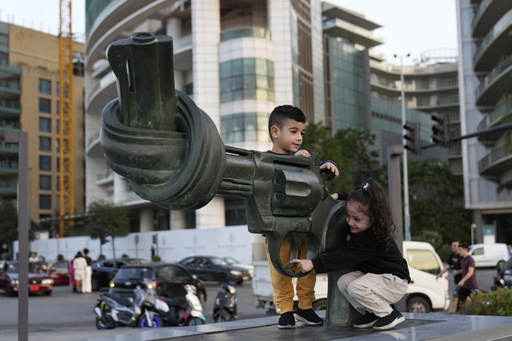
BEIRUT — In a heart-wrenching scene, a little boy named Hussein Mikdad was found curled in his father’s lap, crying uncontrollably as he clung to him. The 4-year-old kicked and pushed away his attending doctor, exclaiming with distress, “My Dad! My Dad! Make him leave me alone!” With tears of anguish and relief in his eyes, his father, Hassan, comforted him, pulling him in closer.
Hussein, along with his father, is now the lone survivor of their family, following a tragic Israeli airstrike on their neighborhood last month. This devastating attack claimed the lives of 18 individuals, including Hussein’s mother, three siblings, and six relatives.
The father turned to the physician and asked, “Can he now shower?” Ten days post-surgery, medics reported that Hussein’s healing process is progressing well. Metal rods have been placed in his fractured right thigh, and stitches have been used to secure his torn tendons back together on his right arm. Although the pain is easing and he is expected to regain the ability to walk in two months, there will be lasting effects, including a potential limp.
Assessing Hussein’s deeper, invisible wounds is far more challenging. The boy has reverted to wearing diapers and is experiencing bedwetting episodes. He remains largely silent, having not spoken about the loss of his mother, brother, and two sisters. “The trauma is not just physical. He is also psychologically wounded,” remarked Imad Nahle, one of Hussein’s orthopedic surgeons.
Israel has stated the airstrike targeted a Hezbollah site, though it offered no detailed explanation. The violence has escalated since mid-September, as Israeli airstrikes have increasingly hit civilian neighborhoods throughout Lebanon, as the country contends with a new wave of conflict sparked by Hamas’ attack in Gaza. As tensions have risen, children have tragically found themselves caught in the crossfire.
A surge in strikes on homes has led to an alarming number of children affected by the ongoing violence. Reports indicate that over 100 children in Lebanon have lost their lives due to attacks in the past six weeks, with countless others left injured. Among the 14,000 wounded since last year, approximately 10% are minors, many of whom are left with lifelong scars from severed limbs, burns, and shattered families. Renowned surgeon Ghassan Abu Sittah expressed concern for Hussein and others, emphasizing that the ongoing conflict may leave a generation of children not only with physical injuries but also emotional scars that will take significant time to heal.
At the American University of Beirut Medical Center, which is handling a limited number of war-related injuries, Nahle informed that he has performed surgeries on five children over the last five weeks, a notable increase from previous months. Many of these cases are referrals from the southern and eastern parts of Lebanon.
Nearby, at the nation’s largest burns center, the medical team has ramped up its resources by nearly 180% since the conflict intensified in September, with around 20% of new admissions being children. Among the young patients is Ivana Skakye, who recently celebrated her second birthday in the hospital. Ivana is recovering from significant third-degree burns sustained during an Israeli airstrike on September 23, a day that would prove to be one of the war’s bloodiest with over 500 casualties.
Now, six weeks post-attack, Ivana is bandaged from head to toe, with burns covering 40% of her small body. Tragically, her family’s home was badly damaged in the explosion, and their efforts to flee saw valued possessions destroyed. The family’s mother, Fatima Zayoun, remembered the shocking moment of the attack and described how time seemed to slow as she rushed to save her children, recalling, “It was as if something lifted me up so that I could grab my kids.”
With her daughters healing in the hospital, Fatima continues to fear the uncertain future as they have no home to return to. After witnessing her children’s pain, she struggles with the lingering trauma of the experience. Zayoun reflected on the previous conflict in 2006, admitting to a sense of camaraderie despite displacement. However, she contemplates the current situation with heartbreak, questioning the rationale behind the violence inflicted upon their family. “What do they want from us? Do they want to hurt our children? We are not what they are looking for,” she lamented.
Dr. Abu Sittah also highlighted the psychological toll of children witnessing violence at home — a previously safe space now transformed into a scene of devastation. The injuries they sustain break through their natural sense of security, deeply impacting how they view their surroundings and the world beyond.
In a makeshift shelter in Dekwaneh, children from various villages come together, trying to immerse themselves in play despite the ongoing turmoil. However, conflicts arising from shared space and limited resources reveal growing anxiety and aggression among them, as reported by Maria Elizabeth Haddad of the International Medical Corps. Parents have noted changes in behavior, such as defiance, clinginess, and issues with speech. The lasting impact of these traumatic episodes suggests a generational trauma that may be hard to overcome.
Currently, more than a million individuals have been displaced by the war, with children making up a considerable number of those affect. As the environment remains unstable, schools have become inaccessible, leaving many young ones without education. Hussein’s father remains hopeful as he starts anew with his son in a temporary refuge, expressing gratitude that his child has not yet begun to question the loss of their family.
The traumatic memories of that harrowing night persist as they navigate a life where comfort and normalcy feel like distant dreams. Hassan, having lost so much in a single moment, finds solace in small gestures, like bringing Hussein a new toy each day, embracing what light he can find amid the devastation. “What I am living through seems like a big lie… I thank God for the blessing that is Hussein,” he reflected, trying to grasp the reality of their situation.
